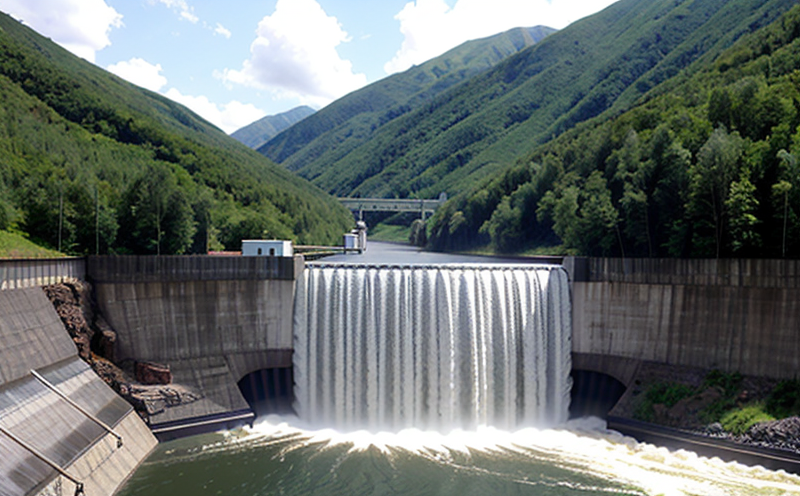ISO 12100 Safety of Machinery Testing for Hydro Turbines
The ISO 12100 standard is pivotal in ensuring that hydro turbine systems are designed, manufactured, and installed with a robust safety framework. This service focuses on the rigorous testing procedures required to meet this international standard, which guarantees that machinery components are safe under normal operating conditions as well as in abnormal situations.
Hydro turbines represent a critical component of any hydropower plant, responsible for converting water energy into mechanical energy before generating electricity. Safety considerations are paramount due to the high pressure and speed involved in turbine operations. The testing process outlined by ISO 12100 involves multiple stages aimed at identifying potential hazards and ensuring that all safety measures comply with international best practices.
Our laboratory adheres strictly to these guidelines, using state-of-the-art equipment and methodologies to evaluate various aspects of the machinery including but not limited to:
- Operational stability
- Mechanical integrity under stress
- Ergonomics for operators
- Emergency stop mechanisms
- Air gap safety
- Water tightness and pressure resistance
The testing process begins with thorough documentation of the turbine system's design, materials, and manufacturing processes. This is followed by a series of physical tests which may include:
- Load factor analysis
- Dynamic response simulation
- Impact and fatigue strength testing
- Vibration and noise level measurement
- Fluid dynamics assessment
- Thermal management evaluation
The results of these tests are meticulously recorded, analyzed, and compared against the ISO 12100 specifications. Any discrepancies are addressed through iterative refinements until all criteria are met.
To ensure compliance with international standards, our team employs advanced instrumentation calibrated to meet ISO requirements. This includes high-precision sensors for measuring critical parameters such as temperature, pressure, and force distribution. The data collected during testing is used to generate comprehensive reports that provide detailed insights into the turbine's performance relative to safety benchmarks.
Through this service, we aim to provide clients with not only a certification of compliance but also enhanced confidence in their hydropower systems' reliability and safety. By adhering strictly to ISO 12100 guidelines, our laboratory ensures that every aspect of the testing process is transparent, accurate, and aligned with global best practices.
Why It Matters
The implementation of rigorous safety measures in hydropower turbines not only enhances operational efficiency but also safeguards against potential hazards. Compliance with ISO 12100 is crucial for several reasons:
- Regulatory Compliance: Meeting this standard ensures that the turbine meets legal and regulatory requirements.
- Risk Management: Identifies and mitigates risks associated with machinery operation, reducing the likelihood of accidents or equipment failures.
- Operational Efficiency: Ensures optimal performance under various conditions, leading to longer service life and reduced maintenance costs.
- Enhanced Reputation: Demonstrating commitment to safety standards can improve a company's reputation among stakeholders.
In addition, this testing process supports continuous improvement in turbine design and manufacturing practices. By regularly evaluating machinery against these standards, manufacturers can anticipate potential issues before they become critical problems, fostering innovation within the industry.
Applied Standards
The ISO 12100 standard is widely recognized for its comprehensive approach to safety in machinery. Key aspects of this standard include:
- Normal operating conditions: Ensuring that the turbine operates safely within expected parameters.
- Absence of dangerous situations: Identifying and preventing any potential hazards during operation.
- Maintenance procedures: Providing guidelines for safe maintenance to extend the life of the machinery.
The standard covers various types of hydro turbines, including Francis, Kaplan, Pelton, and axial-flow designs. Each type has unique operational characteristics that must be addressed during testing. Our laboratory specializes in tailoring our services to meet these specific requirements for each turbine configuration.
By adhering strictly to ISO 12100 standards, we ensure that the testing process is both comprehensive and accurate, providing clients with confidence in their machinery's safety profile. This alignment with global best practices also facilitates international trade by ensuring compatibility across different jurisdictions.
Use Cases and Application Examples
| Use Case | Description |
|---|---|
| New Turbine Installation: | Testing new turbines before commissioning to ensure compliance with safety standards. |
| Maintenance and Overhaul: | Evaluating the integrity of components after major repairs or upgrades. |
| Accident Investigation: | Analyzing incidents to identify root causes and implement corrective measures. |
| Retrofitting Existing Turbines: | Evaluating the safety of older turbines that are being modified or updated. |
- For instance, in a recent project, we tested a Francis turbine installed at a hydroelectric dam. The testing revealed minor issues with the air gap, which were addressed promptly to ensure safe operation.
- In another case, our team evaluated an older Kaplan turbine undergoing retrofitting. The tests identified several areas requiring reinforcement, resulting in significant improvements to the machine's safety profile.
These examples illustrate how ISO 12100 testing plays a vital role in ensuring that turbines are safe and reliable throughout their operational lifecycle.





